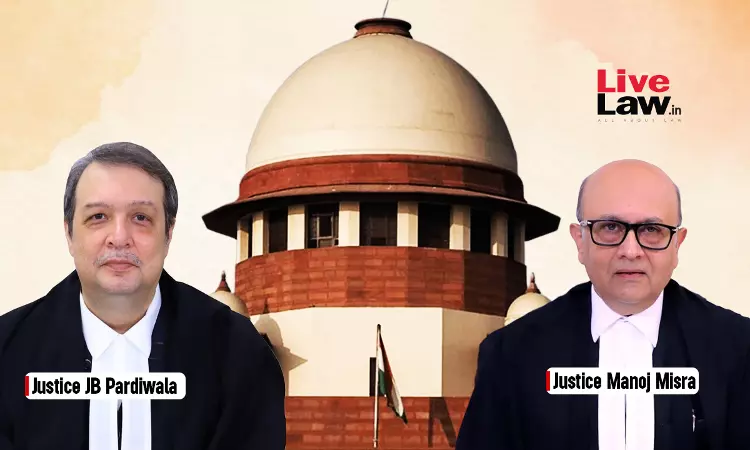- Home
- /
- Supreme court
- /
- S. 357 Cr.P.C. | Payment Of...
S. 357 Cr.P.C. | Payment Of Compensation To Victim Not A Factor To Reduce Convict's Sentence : Supreme Court
Yash Mittal
15 May 2024 3:01 PM GMT
The Supreme Court held that an order for the convict to pay compensation to the victim would not result in the reduction of the sentence imposed on the convict.“In criminal proceedings the courts should not conflate sentence with compensation to victims. Sentences such as imprisonment and / or fine are imposed independently of any victim compensation and thus, the two stands on a...
The Supreme Court held that an order for the convict to pay compensation to the victim would not result in the reduction of the sentence imposed on the convict.
“In criminal proceedings the courts should not conflate sentence with compensation to victims. Sentences such as imprisonment and / or fine are imposed independently of any victim compensation and thus, the two stands on a completely different footing, either of them cannot vary the other.”, the bench comprising Justices JB Pardiwala and Manoj Misra said.
Reversing that part of the High Court's findings which had reduced the sentence imposed on the convicts after the victim was compensated by the convicts, the Court held that the High Court committed an error while doing so as “if payment of compensation becomes a consideration for reducing sentence, then the same will have a catastrophic effect on the criminal justice administration.”
“It will result in criminals with a purse full of money to buy their way out of justice, defeating the very purpose of criminal proceedings.”, the court added
Section 357 of the Code of Criminal Procedure provides the power to award compensation to victims of the offence out of the sentence of fine imposed on the accused. It empowers the court to award compensation to victims while passing judgment of conviction. In addition to conviction, the court may order the accused to pay some amount by way of compensation to the victim who has suffered by the action of the accused.
The court took note of the scheme of Section 357 of Cr.P.C. which intends to reassure the victim that he/she is not forgotten in the criminal justice system.
The Court clarified that the sole factor for deciding the compensation to be paid is the victim's loss or injury as a result of the offence and has nothing to do with the sentence that has been passed. This means thereby, where an accused is directed to pay compensation to victims, the same is not meant as punishment or atonement of the convict but rather as a step towards reparation to the victims who have suffered from the offence committed by the convict.
“The provision of Section 357 (Cr.P.C.) recognizes the aforesaid and is victim centric in nature. It has nothing to do with the convict or the sentence passed. The spotlight is on the victim only. The object of victim compensation is to rehabilitate those who have suffered any loss or injury by the offence which has been committed. Payment of victim compensation cannot be a consideration or a ground for reducing the sentence imposed upon the accused as victim compensation is not a punitive measure and only restitutory in nature and thus, has no bearing with the sentence that has been passed which is punitive in nature.”, the court observed.
The court was considering appeals filed by the victim of an assault offence seeking enhancement of the sentence of the convicts. The convicts were convicted for the offences under Section 323, 325 of the Indian Penal Code and Section 135 of the Gujarat Police Act.
The High Court, in appeal, held that if an amount of Rs 2.50 lakh is paid by each of the two accused before it, then they need not undergo the four years' of sentence as reduced by the High Court.
Keeping in mind that a period of twelve years has elapsed and when the respondents (original convicts) have already deposited the amount of Rs 5 lakh, the Court was not inclined to direct the respondents to undergo a further sentence of four years.
"However, having said so, we direct each of the respondents to deposit a further sum of Rs 5 lakh, i.e. in all Rs 10 lakh, in addition to what they have already deposited before the trial court. This deposit shall be made within a period of eight weeks from today. The trial court shall disburse the entire amount of Rs 15 lakh to the appellant herein (original complainant) after proper identification," the Court stated.
Case Title: Rajendra Bhagwanji Umraniya Versus State of Gujarat
Citation : 2024 LiveLaw (SC) 378
Click here to read/download the order


